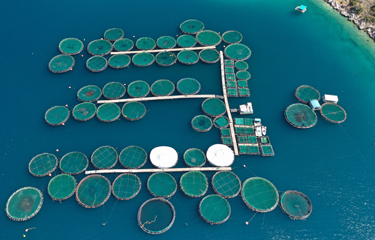Marine aquaculture has been developing rapidly in Turkey over the past decade, according to a new research paper.
A new 430-page report from the Turkish Marine Research Foundation (TUDAV), “Marine Aquaculture in Turkey: Advancements and Management,” offers a thorough examination of the aquaculture sector, looking at lessons learned, how Turkey is embracing a “blue economy” model, and the challenges the country faces in improving the sustainability of its fish and shellfish farming sectors.
Turkey’s aquaculture industry is thriving due to the introduction of new technology, improved management, and production techniques, tighter environmental regulations, and international partnerships helping to open up new markets, according to the report. The industry is benefitting from a plentiful labor supply and low production costs, and the alignment of environmental regulations, quality-control, food safety, traceability systems and paperwork, which has allowed Turkish fishery products to be traded to E.U. countries and globally.
Having access to export markets is essential for Turkey’s aquaculture sector, where the annual consumption of seafood is a mere five to six kilograms per person, compared with an average of 24 kilos per person in Europe. According to the Turkish Statistical Institute, in 2019, 69 percent of the country’s exported fishery products were produced through aquaculture (measured by value), and 80 percent of the country’s fishery exports went to the E.U., though marine products were sent to around 100 countries.
Turkish aquaculture products have gained a strong foothold in the Netherlands, Italy, Russia, Japan, and Greece, and a growing market in the U.S., according to the TUDAV report. Turkey has also targeted the Far East for expansion; the country recently began sending marine products to China and the report predicts the market in China for Turkish products will expand rapidly.
Additionally, Turkey’s aquaculture sector has strong potential to develop further, with ample space available for new marine production sites and environmental conditions amenable to a wider range of marine species, according to the report. The report predicted aquaculture production will reach 600,000 MT in 2023, with a value of around USD 2 billion (EUR 1.7 billion), and fish feed production to reach 900,000 MT.
Through 2050, both production of fish and demand for aquaculture feed is expected to increase significantly, with an emphasis on continued research to replace fishmeal and fish oil with alternative and novel ingredients, such as animal byproducts, seaweed, and plant-based or insect sources.
Turkey’s fish and shellfish farmers have embraced international standards of sustainability and responsible production, with many farms meeting the standards created by the Aquaculture Stewardship Council (ASC), GlobalG.A.P., Friend of the Sea (FOS), Global Aquaculture Alliance Best Aquaculture Practices (GAA BAP) and E.U. Organic certifications. And the country’s seafood processors have worked to comply with quality assurance systems such as ISO 22000, the Foundation for Food Safety Certification’s FSSC 22000, and British Retail Consortium (BRC) Global Standards, amongst others.
The report is essentially a handbook for players, from egg to grow-out, and an insight for investors into this varied sector. It also reviews the history of aquaculture in Turkey – early aquaculture production in the country started with trout (Oncorhynchus mykiss) grown in inland lakes, with small quantities of sea bass (Dicentrarcus labrax) and gilthead seabream (Sparus aurata) produced in wooden sea cages. But the aquaculture sector has grown rapidly in the past 30 years and industrialized; Production of marine and freshwater species rose from around 3,000 metric tons (MT) in 1986 to more than 374,000 MT in 2019. Comparing its aquaculture products with the 28 countries in the European Union, Turkey ranked second in 2018 and in global terms, it ranked nineteenth.
In 2019, the first-sale value of all aquaculture species in Turkey was USD 1.1 billion (EUR 907 million). Countrywide, sea bass production reached 138,000 MT; inland trout production totaled 116,000 MT; sea bream production surpassed 100,000 MT, and sea-grown rainbow trout (also known as Black Sea or Turkish salmon) hit 10,000 MT. The market for this latter species is expected to undergo significant growth in the next decade, according to the TUDAV report..
Turkey is also developing its Atlantic bluefin tuna (Thunnus thynnus) ranching industry, with several companies involved in this sector. Tuna ranching will remain controversial until full-lifecycle tuna farming is achieved in meaningful quantities, in order to reduce pressure on the wild catch, the report said.
Production of sixteen other marine aquaculture species is currently being considered or developed, including meagre (Argyrosomus regius); turbot (Psetta maxima); Greater amberjack (Seriola dumerili); shi drum (Umbrina cirrosa); common dentex (Dentex dentex); sharpsnout seabream (Diplodus puntazzo); Mediterranean mussels (Mytilus galloprovincialis); pink dentex (Dentex gibbosus); and porgies (Sparidae).
Increased production will require additional marketing effort and new product ideas, and the report recommends Turkish farmers pursue product diversity and innovation that creates added value at source. Research is also recommended into prioritizing the production of byproducts such as caviar, as well as extracting raw materials for cosmetics and medicine from marine species such as seaweed, the report found, saying that such a move would help to expand the overall market share of the sector.
The report is positive about the prospects for sustainable aquaculture in Turkey over the next 30 years, but warns that climate change could be an obstacle to development, with potential serious implications for seafood production, for food security, and the livelihoods of millions of people.
Photo courtesy of Aerial-motion/Shutterstock







